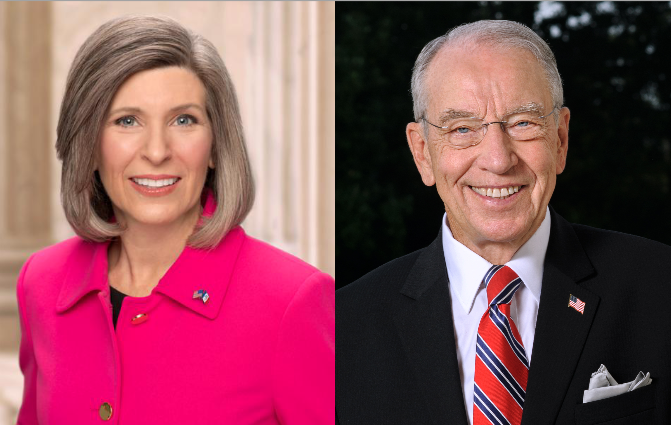U.S. Senators Joni Ernst and Chuck Grassley were among the 35 Republicans who voted on May 28 to block debate on a bill to form a bipartisan commission to investigate the January 6 attack on the Capitol. Since Senate rules require 60 votes for most motions, the 48 Democrats and six Republicans who supported the measure were unable to proceed to debate–even though they made up 61 percent of those present and voting.
Technically, today’s action was the first filibuster Republicans have executed since Democrats took control of the Senate following the January runoff elections in Georgia. However, GOP senators have prevented many other bills from coming to the floor by making clear they would filibuster.
In a written statement enclosed in full below, Grassley said the January 6 events are already being investigated, while Congress has ignored the “broader picture” of riots occurring elsewhere in the U.S. over the past year. (Protests that occurred in various cities last summer are hardly equivalent to an assault instigated by the president with the goal of disrupting the peaceful transfer of power.)
Earlier this week, Grassley told a Bloomberg News reporter he would support a January 6 commission more like the 9/11 commission “because that was a bipartisan commission chaired by people outside the Congress”–which is what the House-approved bill would create.
Ernst has not released a statement on today’s vote, but I will update this post as needed. She told Capitol Hill reporters on May 19 that the commission would not be balanced (despite equal representation for both parties), because of disparities in staffing and salaries. Ernst added, “Here we are five months later. What is the point? It’s turning into a political exercise.”
The six Republicans who crossed party lines to support debating the January 6 commission bill were Susan Collins of Maine, Bill Cassidy of Louisiana, Mitt Romney of Utah, Ben Sasse of Nebraska, Lisa Murkowski of Alaska, and Rob Portman of Ohio. All but Portman had voted to convict Donald Trump in his second impeachment trial. Another Republican who voted to convict Trump, Pat Toomey of Pennsylvania, was absent for today’s vote but had indicated he was willing to break the filibuster, according to journalist Jamie Dupree.
Iowa’s U.S. House delegation split 2-2 on forming a bipartisan January 6 commission. Democratic Representative Cindy Axne (IA-03) and Republican Representative Mariannette Miller-Meeks (IA-02) supported the bill, while Republicans Ashley Hinson (IA-01) and Randy Feenstra (IA-04) opposed it. Miller-Meeks has yet to issue any statement about this vote. Hinson’s official explanation for voting no did not clarify why she had co-sponsored similar legislation in January.
Full text of May 28 news release from Senator Chuck Grassley:
Grassley: Review Of Capitol Attack Already Underway; Broader Examination Of Political Violence Still Needed
WASHINGTON – Sen. Chuck Grassley (R-Iowa), Ranking Member of the Senate Judiciary Committee, today issued the following statement on the Senate’s consideration of a proposal to establish a separate commission to examine the January 6, 2021, attack on the U.S. Capitol:
“While the January 6 attack on the U.S. Capitol is already the subject of much scrutiny both on Capitol Hill and by federal law enforcement, Congress has paid little attention to the rash of riots outside of Washington over the past year. What message does Congress send to the American people when we have a commission for riots in Washington but ignore the ones across the rest of the country?
“A narrow commission focused only on the Capitol riot not only ignores the broader picture, but it would also be on top of various congressional and criminal investigations already underway, taking more time and costing more tax dollars. If we truly want to get to the bottom of anti-government violence, intellectual honesty demands that we take a broader look at destruction and violence that occurred in nearly every major city over the last year.”
Capitol Attack Investigations Underway
Grassley condemned the attack on the Capitol and was part of a major bipartisan multi-committee effort to investigate the government breakdowns that occurred on January 6. He and Judiciary Committee chairman Dick Durbin (D-Ill.) pushed the FBI for answers surrounding the attacks and questioned Director Wray about it at a March hearing on domestic extremism. A separate investigation conducted by the Senate Rules Committee and Homeland Security and Governmental Affairs Committee is expected to yield a report in June.
Nationwide Political Violence
Civil unrest last summer took a serious toll: more than 900 law enforcement officers were injured responding to violent riots, including 277 federal officer injuries defending a courthouse in Portland, Ore., and 60 Secret Service officers defending the White House. At least 14,000 people were arrested in riots that occurred in 49 cities across the country over the summer. At least 25 people were killed in those riots. Damage sustained to businesses and other personal property could exceed $2 billion. As a result of last summer’s violence perpetrated largely by anti-government or anti-law enforcement extremists, the FBI opened more than 300 domestic terrorism cases.
Grassley has repeatedly called on Congress to call out all forms of political violence. He invited Durbin to broaden the scope of a hearing on domestic extremism to include last year’s riots and pushed federal law enforcement to provide data on violence perpetrated by groups from across the political spectrum.

